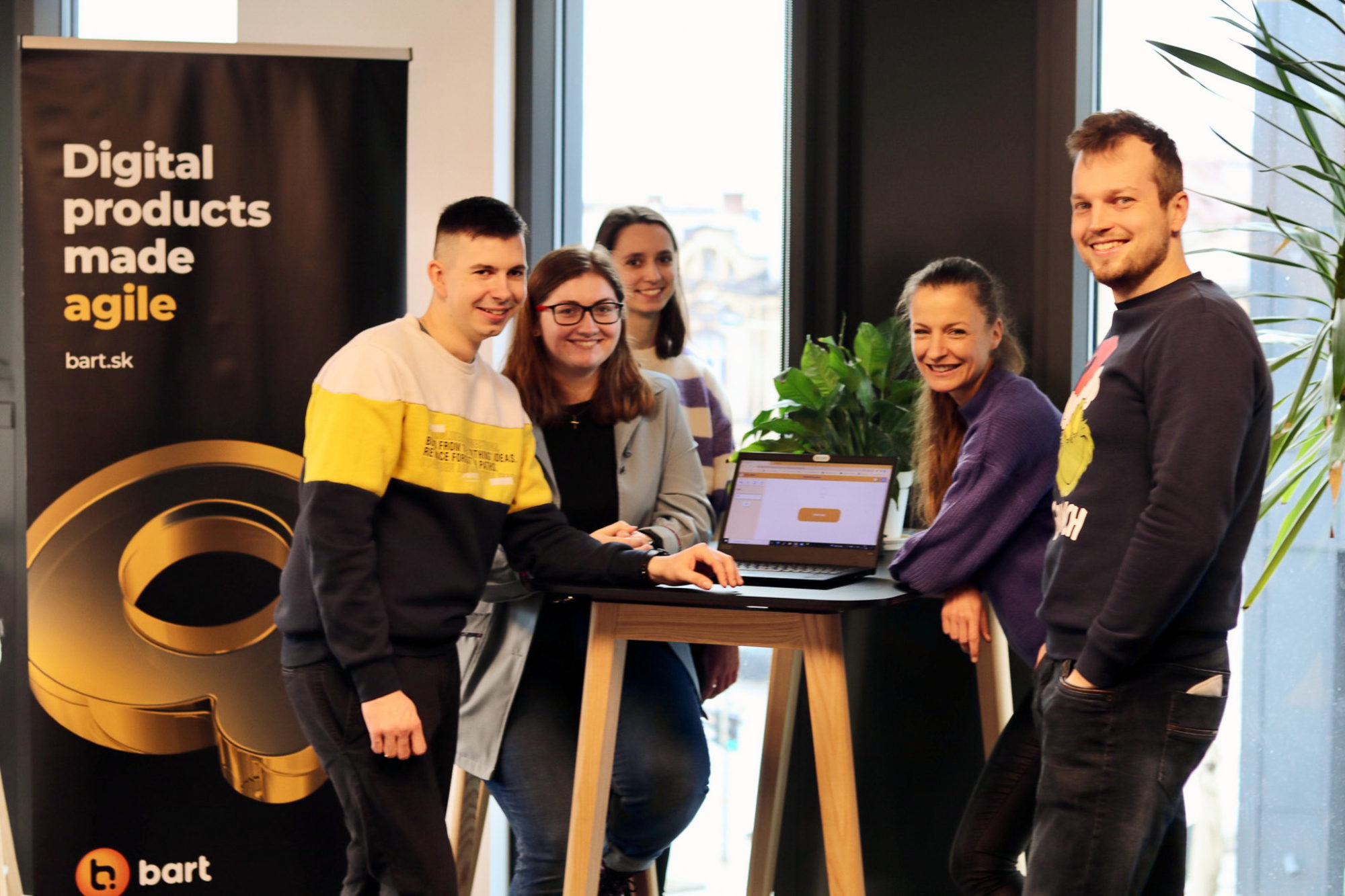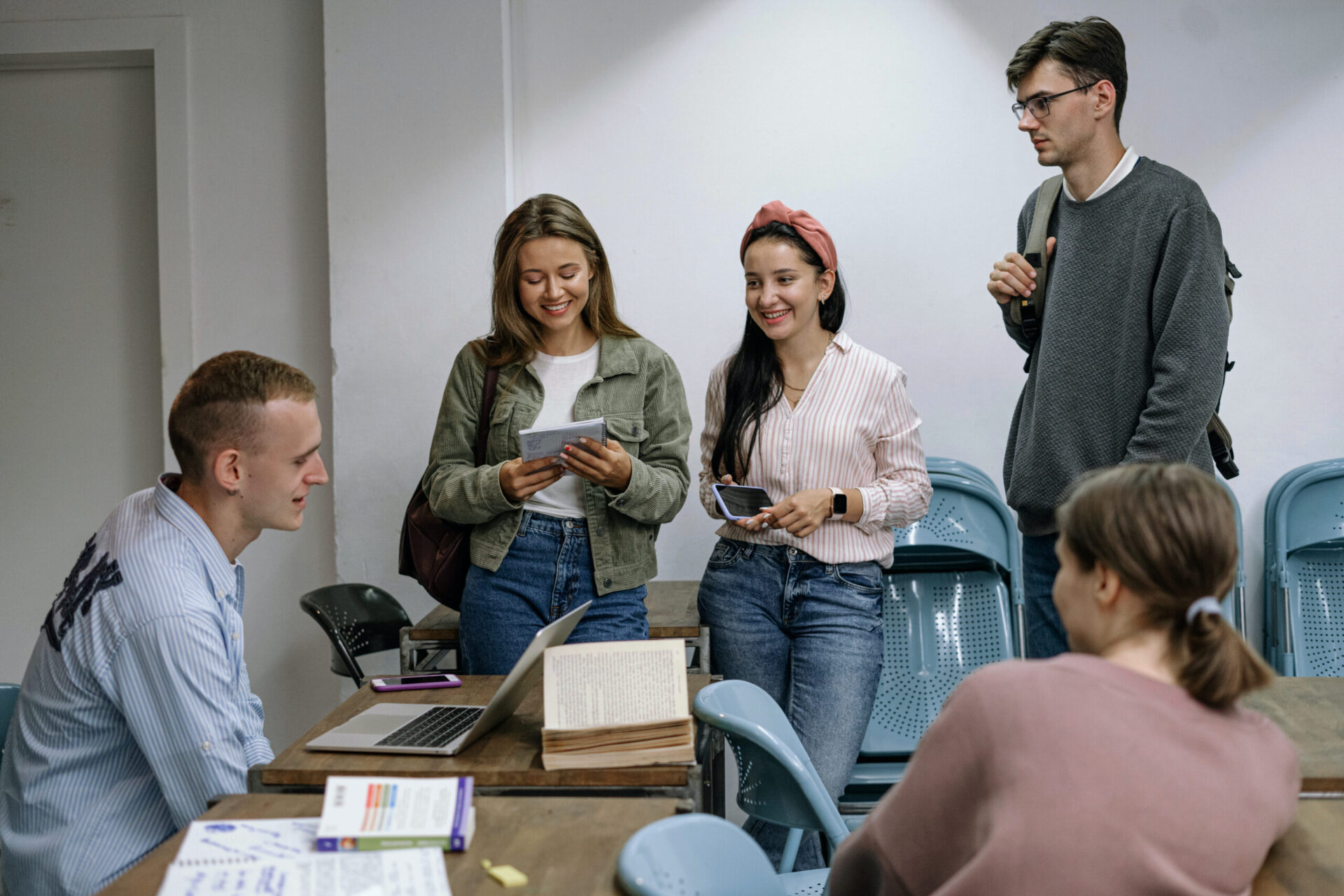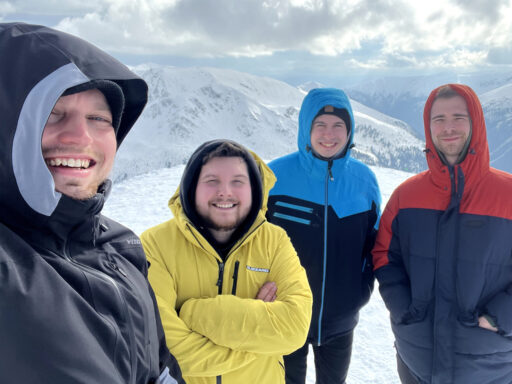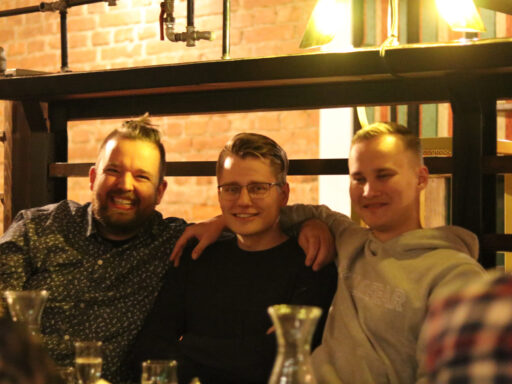Universities should primarily prepare their students for real life. However, lectures and seminars are often not enough – theory needs to be supplemented with practice. That’s why the course Live IT Projects was introduced into the schedules of students of the 4th year of informatics and cybersecurity at TUKE. Thanks to them, they can try live coding directly in one of the IT companies in Košice. For example, in ours. If it goes well, one-semester cooperation sometimes grows into an employment contract.
In 8 years of our participation in the project, we’ve grown by several great colleagues. Most of them took their place at the work desk while still studying at the university. How did they manage to combine school and work, what did Live IT projects give them and how to choose the right topic according to them? We asked them all this in an interview.
Viki, Mišo, Ondrej and Pali, you’re basically new to bart. You joined us last year practically immediately after Live IT Projects. How did you choose the topic for this course?
Mišo:
 When we looked at the topics listed for Live IT Projects, at first we were a little disappointed because many of them seemed too demanding and difficult to implement. We preferred those that were well described. Meaning they had a summary of some necessary technical background, a basic description of the solution, a clear goal described (to make an application, web or mobile), and proposed technologies. 2 of the 3 topics we chose were the ones from bart. In hindsight, I’m very glad that we managed to choose this company. Working on the project has not only taught us new ways to use well-known technologies, but it has also given us the opportunity to meet great people with whom we make up a team today 🙂
When we looked at the topics listed for Live IT Projects, at first we were a little disappointed because many of them seemed too demanding and difficult to implement. We preferred those that were well described. Meaning they had a summary of some necessary technical background, a basic description of the solution, a clear goal described (to make an application, web or mobile), and proposed technologies. 2 of the 3 topics we chose were the ones from bart. In hindsight, I’m very glad that we managed to choose this company. Working on the project has not only taught us new ways to use well-known technologies, but it has also given us the opportunity to meet great people with whom we make up a team today 🙂
Viki:

My classmates from my team and I didn’t focus on companies in any specific way. Rather, we looked at topics and, for example, “Aj Ty Poker” caught our attention immediately because it was clearly described and practical. The second decisive factor was technology – we wanted to work with those technologies which we had at least some experience with.
What would you advise this year’s fourth-years who are choosing a topic?
Mišo:
In my opinion, everyone should ask themselves what they expect from this course. Whether it’s just another “must-do thing” or whether they want to learn something new. It’s ideal to find a project in an area where they want to improve. And they should choose topics not only according to the descriptions, but also according to the sponsors from the companies. They should pay attention to what the company is doing and choose what is close to them.
Viki:
I think the most important thing is that students try to choose a topic that could be fun for them. Then the work is much easier.
Ondrej:
In my opinion too, students should focus mainly on topics that interest them. At the same time, however, there’s no need to be afraid of technologies which aren’t familiar, after all, it’s a course where they can learn directly from experts in practice. It’s important that they take as much as possible from this, as the development process is very similar to what it is in reality, and it’s a valuable experience for the future.
Pali:
I agree, it’s necessary to pay attention to the description of the project and also the technology that’s recommended to be used in the implementation of the project. It’s even worth taking a risk and trying those with which the fourth-years have no experience. For example, we worked on a project with AWS, which we encountered for the very first time. However, we were already familiar with other technologies, so it complemented nicely.
How do you rate the Live IT Projects themselves?
Viki:
Very positive, because we could try what it’s like to work with a company, communicate with it and deal with the whole project. However, all the responsibility for what and how we organize and divide was up to us. And the best part is that thanks to this project, we got the opportunity to work at bart at the end.
How did your experience from Live IT Projects translate into working on real projects?
Viki:
Thanks to Live IT, I got an idea of Scrum and how it works within a project. Even then we had a 3 week sprint, just like we have in Crossuite now. Acustoming myself to this system at work was therefore easier for me. However, I took one key finding from the whole project into my life: In a project, and not only there, planning and communication between team members is the most important thing.
Mišo:
Working on a project within Live IT taught me especially how to work in a team. And it also introduced various processes – from the first planning, through meetings where we presented the progress of the project, to the final demo presentation.
 Mišo (left) and Viki (center) in bart while testing the “Aj Ty Poker” app.
Mišo (left) and Viki (center) in bart while testing the “Aj Ty Poker” app.
Viki, Mišo, you have completed Live IT Projects with your colleagues from the Crossuite project, where you continue to work even now. How is the work “for a course” and “live” different?
Viki:
Crossuite is a big project and it took me a while to get my bearings. Even after almost half a year, something new is still to be found. But at least it’s not a stereotype. I see the difference in comparison to school mainly in the size of the team and overall complexity.
Mišo:
I see the biggest differences between our work in the team and a real project in the fact that everything that is to be done on a real application is pre-analyzed, estimated, planned and the design for it is created. In our “school” application, it was hectic, especially at the beginning, and we did many features “ad hoc”. This resulted in a lot of unnecessary extra work, because we reworked it several times. Nearing the end, we learned to work more efficiently thanks to Scrum.
Ondrej and Pali, you, on the other hand, completed last year’s Live IT Projects in another company, but after their completion you decided to join us. Why?
Ondrej:
To be honest, the company we worked with as part of Live IT didn’t reply to my e-mail 😀 But as soon as during Live IT Projects, we were interested in the topic offered by bart, but in the end they didn’t assign it to us. Thanks to this, however, I visited the website where various case studies caught my attention, as well as directly advertised job offers for temporary workers. Working in bart, I feel very well, there’s an excellent team, an interesting project and, most importantly, I’ve learned a lot of new things that I didn’t know about until recently.
Pali:
I liked the lecture that bart presented at our school and also what bart is working on. So far, I rate it positively, as I learn many things and gain various experiences here.
Miška, Katka and Ady, for you, Live IT Projects are a thing of the past. Today, you’re graduated software engineers and you did excellently at state exams, despite the fact that you were dividing your time between school and work at bart throughout the 5th grade. What was difficult about this combination and what benefits did it bring you?
Miška:
The combination of working with school significantly reduced my free time and postponing my duties to the last minute 😀 Sometimes it was difficult to set priorities and cut the level of perfectionism in school assignments. On the other hand, thanks to my work, I already had a slightly different view of programming. For example, I got the opportunity to monitor the processes on the project, from the origin of an idea to its implementation, and even participate in them. School doesn’t allow this view. In addition to my work experience, I could also move forward personally. I learned to be more responsible and how to present my work more confidently, which helped me with successfully passing the state exams as well.
Katka:
The most difficult thing is to “put it together” when it comes to timing, especially during the exam period, when it’s often not even clear on what date an exam will take place. But overall, in my opinion, the work-school combination has more advantages than disadvantages. With practice, we simply gain more experience. Not that it isn’t possible to pick up any at school, but the ones from behind a school desk are certainly incomparable to those we get at work.
Ady:
I don’t think the work-uni combination is difficult. In grades 4 and 5, the student can choose a schedule so that he or she can be at the office more than at school. I really only needed a month off to finish my thesis and prepare for state exams. Even during university, I wanted to be treated as a full-fledged colleague at bart, not as a student, so I tried to approach work in this way. In my opinion, this is also the right course of action if a person is serious about a company and wants to continue in it after their studies. So I see mainly advantages, such as a much easier transition from student life to adult life.
Looking back, what did Live IT Projects give you?
Miška:
Live IT projects brought me experience with technologies I hadn’t been in contact with before. And it was these that subsequently helped me open the door to the world of bart.sk. At school, for example, we had an introduction to websites, but it was only the absolute basics, I didn’t know what backend and frontend were, where their boundaries were and how they communicate with each other. And I didn’t know any frameworks, such as React.js, or working with Blockchain or the Ethereum platform. I encountered Blockchain thanks to Live IT Projects and this technology eventually became the topic of my diploma thesis.
Finally, what would you recommend to students whose Live IT Projects are yet to come?
Miška:
Don’t be afraid of the topic and don’t take it just as a university assignment that must be fulfilled! (Author’s note: With an exclamation mark! Really big emphasis :D) Think of it as an opportunity to get new information, contacts. And maybe you’ll also get a new group of classmates from the team with whom you’ll like to go for a drink, and a job where you don’t go just because you have to.
Katka:
In addition to an interesting topic, choose a good team so that you don’t end up doing the work of five people because others are lazy 🙂
Ady:
I agree, and then it’s good to agree with the team on a topic that most members understand, because then there’s a better chance that you’ll achieve a better quality result together. My second piece of advice is that Live IT definitely shouldn’t be seen as a competition, rather as a chance to meet people and create an application that can really be used in the future.
Ondrej:
Educate yourself in modern technologies even in your free time, then this course will be a piece of cake for you 😉
Mišo:
Don’t perceive the Live IT projects course as a duty, but as a very good opportunity that can change your life.
Thank you for the interview.












